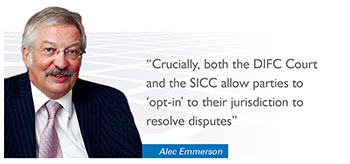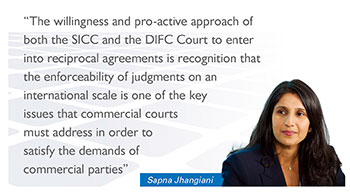Alec Emmerson, Sapna Jhangiani and John Lewis from Clyde & Co note how domestic courts are raising their game as the complexity of commercial disputes increases with specific focus on Singapore and the Middle East, each of which have options beyond arbitration.
The growth of parties seeking to resolve their disputes through arbitration in both Singapore and the UAE has increased steadily over recent years. The main draws of arbitration are undoubtedly confidentiality and the ability to enforce foreign arbitral awards in each of the signatory states pursuant to the New York Convention on the Recognition and Enforcement of Foreign Arbitral Awards (the New York Convention).
However, in the words of Sundaresh Menon, Singapore’s Chief Justice, domestic courts “from London to Dubai and New South Wales to Delaware” are raising their game to meet the challenge of handling increasingly sophisticated commercial disputes and new, specialised international commercial courts are emerging which aim to provide a viable alternative to the arbitration process.
In Singapore, the recently created SICC, established as a division of the Singapore High Court under the Supreme Court of Judicature Act, is mandated to hear international commercial disputes arising out of cross-border agreements. The SICC exists alongside the Singapore International Arbitration Centre (SIAC), thus providing parties seeking to resolve disputes in Singapore with a choice between, amongst other things, arbitration or cross-border court litigation.
 The Dubai International Financial Centre (DIFC) is a financial freezone in Dubai governed by the common law for civil matters, with its own English language common law court (as opposed to the rest of the United Arab Emirates and its neighbour states with their Arabic language civil law courts). Where parties elect to resolve their disputes in the UAE, the courts of the DIFC, which are modelled on the English Commercial Court, offer an alternative to arbitration centres such as the Dubai International Arbitration Centre (DIAC) and the DIFC-LCIA Arbitration Centre, as well as the Dubai Courts (outside the DIFC).Crucially, both the DIFC Court and the SICC allow parties to ‘opt-in’ to their jurisdiction to resolve disputes. Both therefore face the same challenges as arbitral institutions when seeking to promote their services to users and must, if they are to succeed, offer a viable alternative to parties involved in cross-border disputes. The factors that users will look at do not relate solely to the dispute resolution process itself, but also extend to the enforcement of any favourable judgment by a successful party. The idea for the establishment of the SICC arose following a visit by Chief Justice Menon to the London Commercial Court which made it clear to him that having a world-class commercial court alongside an international arbitration hub is not a ‘zero-sum game’. Menon emphasised that he did not wish to suggest that the DIFC Court and SICC were superior to international arbitration, just that they offer a choice of dispute resolution forum depending on the relevant factors important to the parties, such as, for example:
|
 For commercial parties operating in Dubai and Singapore, the SICC and the DIFC are signatories to a memorandum of guidance; and a memorandum of understanding on January 19, 2015 which provides guidance for the mutual recognition and enforcement of court judgments between the two jurisdictions.In addition, Singapore is also party to a limited number of treaties for the mutual recognition and enforcement of judgments (including with India) and its judgments are enforceable abroad in commonwealth countries such as the UK and the US. The DIFC Court is also party to several memoranda with, for example, the English Commercial Court; United States District Court for the Southern District of New York; the Federal Court of Australia; the Supreme Court of New South Wales; the High Court of Kenya; and the Supreme Court of Kazakhstan, each of which sets out the principles and processes for the enforcement of judgments between jurisdictions. The willingness and pro-active approach of both the SICC and the DIFC Court to enter into reciprocal agreements is recognition that the enforceability of judgments on an international scale is one of the key issues that commercial courts must address in order to satisfy the demands of commercial parties. This approach is not, however, limited to the SICC and DIFC Court. The 2005 Hague Convention on Choice of Court Agreements (the Hague Convention), which came into effect in 29 EU states on October 1, 2015 and applies to international commercial contracts, is based on the following three premises:
|
 The Hague Convention was recently described by Singapore’s Chief Justice, Surendesh Menon, as a “game changer” and by the DIFC’s Chief Justice Michael Hwang SC as “a sort of mini version of the New York Convention”.The US, Mexico and Singapore are signatories to the Hague Convention, although the Hague Convention has not yet been ratified in Singapore and does not, therefore, form part of domestic law. However, upon ratification, judgments of the Singapore High Court and the SICC will be enforceable in, at least for the time being, each of the 29 EU signatory states offering additional comfort to parties seeking to resolve international commercial disputes before the Singapore courts. The UAE has not, to date, signed the Hague Convention. The enforcement of either court judgments (including the DIFC Court) outside of the UAE; or foreign court judgments within the UAE (including within the DIFC) will, therefore, continue to take place pursuant to pre-existing treaties and memoranda. Both the commercial court system and international arbitration have their own pros and cons. Whilst arbitration remains the preferred method of dispute resolution due to the enforcement provisions of the New York Convention, the steps that commercial courts are taking to assist with the enforcement of foreign court judgments, coupled with the possibility of an increasing number of countries signing up to the Hague Convention, are positive moves which will increase the appeal of commercial courts. Commercial courts are increasingly viable alternatives to commercial parties operating on an international playing-field, in which there is no ‘one size fits all’ when it comes to choosing a dispute resolution mechanism. |
Email: alec.emmerson@clydeco.com
sapna.jhangiani@clydeco.com
john.lewis@clydeco.com
Website: www.clydeco.com




















